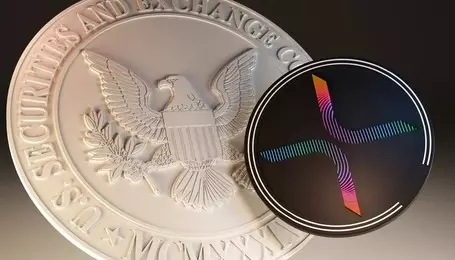The ongoing legal battle between Ripple and the US Securities and Exchange Commission (SEC) has captured the attention of the cryptocurrency industry. In a recent interview, Ripple CEO Brad Garlinghouse criticized the SEC’s regulatory approach and highlighted the wins Ripple has achieved in the legal proceedings. Additionally, pro-XRP lawyer John Deaton chimed in on the matter, strengthening Ripple’s position. The outcome of this case will likely have significant implications for the cryptocurrency industry as a whole.
Garlinghouse emphasized three consecutive wins for Ripple in the legal proceedings against the SEC. Firstly, a judgment on July 13 clearly stated that XRP is not a security. This decision was crucial for Ripple as it dispelled the uncertainty surrounding XRP’s classification. Secondly, Ripple denied the court’s interlocutory appeal, indicating their confidence in the legal arguments they presented. Finally, allegations against Ripple co-founder Chris Larsen and Garlinghouse himself were dismissed. These victories demonstrate Ripple’s strong defense and ability to challenge the SEC’s claims.
Garlinghouse criticized the SEC’s approach to regulation by enforcement and lawsuit patterns. He argued that the SEC needs to step back and realize that their actions are deviating from their mission to protect investors. He questioned who the SEC is truly protecting in this journey and called for a change in their regulatory approach. Garlinghouse’s remarks highlight the frustration felt by Ripple and many in the cryptocurrency industry regarding the SEC’s enforcement tactics.
While acknowledging the potential capital influx that an approved exchange-traded fund (ETF) could bring, Garlinghouse emphasized the importance of regulatory clarity, utility, and scalable problem-solving for the industry to thrive. Without clear regulations, it becomes challenging for cryptocurrency companies to operate and investors to feel secure. Garlinghouse’s optimism for the industry’s future stems from his belief in macro catalysts that will propel it forward in the next five to ten years.
Pro-XRP lawyer John Deaton provided further support to Ripple’s position by questioning the SEC’s disgorgement claim. Deaton argued that the SEC’s demand for a $770 million disgorgement related to XRP sales in various jurisdictions is flawed. He pointed out that XRP is considered a non-security and a legal exchange/utility token in those jurisdictions. Deaton highlighted that the Court’s goal is not to punish Ripple as it is not a fraud case. He further explained that the disgorgement amount would be significantly reduced after considering non-US sales, sales to accredited investors, and minimal harm caused by certain transactions.
The remarks made by Brad Garlinghouse and John Deaton underscore Ripple’s firm stance on XRP’s classification and its criticism of the SEC’s regulatory approach. Ripple believes that it has been unfairly targeted and that the SEC’s actions are harming the industry rather than protecting investors. It remains to be seen how the legal battle will unfold and what impact it will have on the cryptocurrency industry as a whole.
The outcome of the Ripple-SEC legal battle is crucial for the cryptocurrency industry. If Ripple emerges victorious and XRP is officially deemed a non-security, it could set a precedent for other cryptocurrencies facing regulatory challenges. On the other hand, if the SEC prevails, it could strengthen the regulatory environment and potentially impact the operations of other cryptocurrencies. The decision will have far-reaching implications, shaping the future of the industry.
Amidst the ongoing legal battles, XRP’s price has exhibited a sideways movement, currently trading at $0.660. Despite the lack of significant upward or downward movement, XRP has experienced substantial gains in the past 30 days, surging by more than 35%. On a year-to-date basis, it has recorded an impressive growth of over 70%. This demonstrates the resilience of XRP’s market position despite the regulatory uncertainties surrounding Ripple.
The ongoing legal battle between Ripple and the SEC symbolizes a turning point for the cryptocurrency industry. Ripple’s victories in the legal proceedings, along with criticism of the SEC’s regulatory approach, highlight the importance of regulatory clarity and industry-friendly policies. The outcome of this case will not only determine Ripple’s future but also shape the regulatory landscape for cryptocurrencies. As the cryptocurrency industry continues to evolve, it is essential for regulators to strike a balance between investor protection and fostering innovation.














Leave a Reply